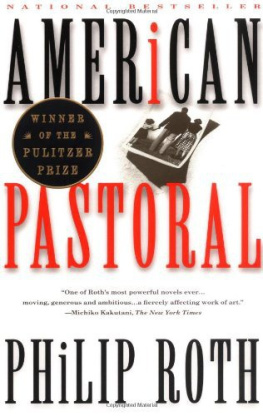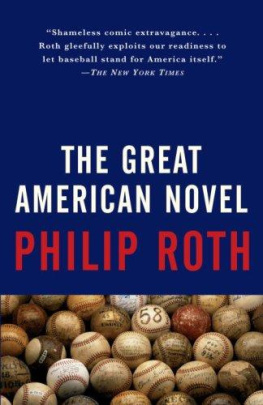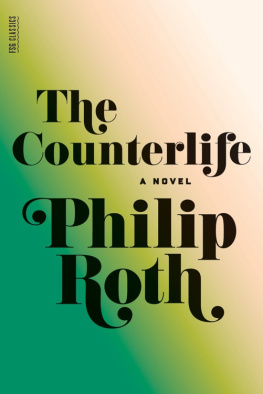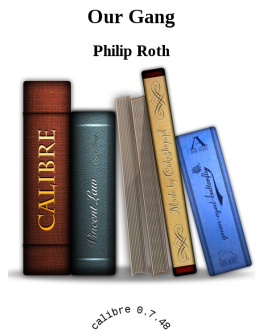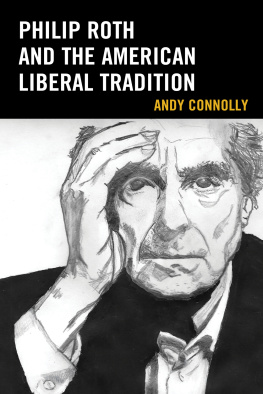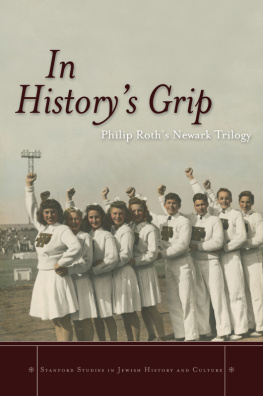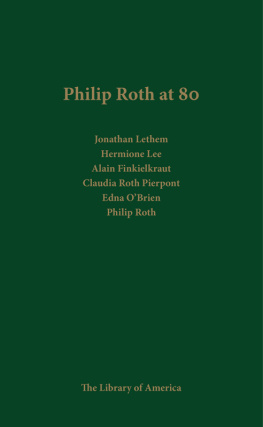AMERICAN PASTORAL
Philip Roth
VINTAGE INTERNATIONAL
Vintage Books
A Division of Random House, Inc. New York
To J. G.
FIRST VINTAGE INTERNATIONAL EDITION, FEBRUARY 1998 Copyright 1997 by Philip Roth
All rights reserved under International and Pan-American Copyright Conventions. Published in the United States by Vintage
Books, a division of Random House, Inc., New York, and simultaneously in Canada by Random House of Canada Limited, Toronto. Originally published in hardcover in the United States by Houghton Mifflin Company, New York, in 1997. "Dream" by Johnny Mercer. Copyright 1944 (renewed), WB Music Corp. All rights reserved. Used by permission. Warner Bros. Publications U.S. Inc., Miami, Florida, 33014. Library of Congress Cataloging-in-Publication Data Roth, Philip. / Philip Roth.--1st Vintage International ed. p. cm. ISBN 0-375-70142-7 1. United States--History--1961-1969--Fiction. I. Title. PS3568.0855A77 1998 97-35623 813'.54--dc21 CIP Random House Web address: http://www.randomhouse.com/ Printed in the United States of America 3579B864
Dream when the day is thru, Dream and they might come true, Things never are as bad as they seem, so dream, dream, dream.
-- Johnny Mercer, from "Dream" popular song of the 1940$
the rare occurrence of the expected ...
-- William Carlos Williams, from "At Kenneth Burke's Place," 1946
I
Paradise Remembered
The Swede. During the war years, when I was still a grade school boy, this was a magical name in our Newark neighborhood, even to adults just a generation removed from the city's old Prince Street ghetto and not yet so flawlessly Americanized as to be bowled over by the prowess of a high school athlete. The name was magical; so was the anomalous face. Of the few fair-complexioned Jewish students in our preponderantly Jewish public high school, none possessed anything remotely like the steep-jawed, insentient Viking mask of this blue-eyed blond born into our tribe as Seymour Irving Levov.
The Swede starred as end in football, center in basketball, and first baseman in baseball. Only the basketball team was ever any good--twice winning the city championship while he was its leading scorer--but as long as the Swede excelled, the fate of our sports teams didn't matter much to a student body whose elders, largely undereducated and overburdened, venerated academic achievement above all else. Physical aggression, even camouflaged by athletic uniforms and official rules and intended to do no harm to Jews, was not a traditional source of pleasure in our community-- advanced degrees were. Nonetheless, through the Swede, the neighborhood entered into a fantasy about itself and about the world, the fantasy of sports fans everywhere: almost like Gentiles (as they imagined Gentiles), our families could forget the way things actually work and make an athletic performance the repository of all their hopes. Primarily, they could forget the war.
The elevation of Swede Levov into the household Apollo of the Weequahic Jews can best be explained, I think, by the war against the Germans and the Japanese and the fears that it fostered. With the Swede indomitable on the playing field, the meaningless surface of life provided a bizarre, delusionary kind of sustenance, the happy release into a Swedian innocence, for those who lived in dread of never seeing their sons or their brothers or their husbands again.
And how did this affect him--the glorification, the sanctification, of every hook shot he sank, every pass he leaped up and caught, every line drive he rifled for a double down the left-field line? Is this what made him that staid and stone-faced boy? Or was the mature-seeming sobriety the outward manifestation of an arduous inward struggle to keep in check the narcissism that an entire community was ladling with love? The high school cheerleaders had a cheer for the Swede. Unlike the other cheers, meant to inspire the whole team or to galvanize the spectators, this was a rhythmic, foot-stomping tribute to the Swede alone, enthusiasm for his perfection undiluted and unabashed. The cheer rocked the gym at basketball games every time he took a rebound or scored a point, swept through our side of City Stadium at football games any time he gained a yard or intercepted a pass. Even at the sparsely attended home baseball games up at Irvington Park, where there was no cheerleading squad eagerly kneeling at the sidelines, you could hear it thinly chanted by the handful of Weequahic stalwarts in the wooden stands not only when the Swede came up to bat but when he made no more than a routine putout at first base. It was a cheer that consisted of eight syllables, three of them his name, and it went, Bah bah- bah! Bah bah bah... bah-fraW and the tempo, at football games particularly, accelerated with each repetition until, at the peak of frenzied adoration, an explosion of skirt-billowing cartwheels was ecstatically discharged and the orange gym bloomers of ten sturdy little cheerleaders flickered like fireworks before our marveling eyes... and not for love of you or me but of the wonderful Swede. "Swede Levov! It rhymes with ... 'The Love'!... Swede Levov! It rhymes with... 'The Love'!... Swede Levov! It rhymes with ... 'The Love'!"
Yes, everywhere he looked, people were in love with him. The candy store owners we boys pestered called the rest of us "Hey-you-no!" or "Kid-cut-it-out!"; him they called, respectfully, "Swede." Parents smiled and benignly addressed him as "Seymour." The chattering girls he passed on the street would ostentatiously swoon, and the bravest would holler after him, "Come back, come back, Levov of my life!" And he let it happen, walked about the neighborhood in possession of all that love, looking as though he didn't feel a thing. Contrary to whatever daydreams the rest of us may have had about the enhancing effect on ourselves of total, uncritical, idolatrous adulation, the love thrust upon the Swede seemed actually to deprive him of feeling. In this boy embraced as a symbol of hope by so many--as the embodiment of the strength, the resolve, the emboldened valor that would prevail to return our high school's servicemen home unscathed from Midway, Salerno, Cherbourg, the Solomons, the Aleutians, Tarawa--there appeared to be not a drop of wit or irony to interfere with his golden gift for responsibility.
But wit or irony is like a hitch in his swing for a kid like the Swede, irony being a human consolation and beside the point if you're getting your way as a god. Either there was a whole side to his personality that he was suppressing or that was as yet asleep or, more likely, there wasn't. His aloofness, his seeming passivity as the desired object of all this asexual lovemaking, made him appear, if not divine, a distinguished cut above the more primordial humanity of just about everybody else at the school. He was fettered to history, an instrument of history, esteemed with a passion that might never have been if he'd broken the Weequahic basketball record--by scoring twenty-seven points against Barringer--on a day other than the sad, sad day in 1943 when fifty-eight Flying Fortresses were shot down by Luftwaffe fighter planes, two fell victim to flak, and five more crashed after crossing the English coast on their way back from bombing Germany.
The Swede's younger brother was my classmate, Jerry Levov, a scrawny, small-headed, oddly overflexible boy built along the lines of a licorice stick, something of a mathematical wizard, and the January 1950 valedictorian. Though Jerry never really had a friendship with anyone, in his imperious, irascible way, he took an interest in me over the years, and that was how I wound up, from the age of ten, regularly getting beaten by him at Ping-Pong in the finished basement of the Levovs' one-family house, on the corner of Wynd-moor and Keer--the word "finished" indicating that it was paneled in knotty pine, domesticated, and not, as Jerry seemed to think, that the basement was the perfect place for finishing off another kid.
Next page
